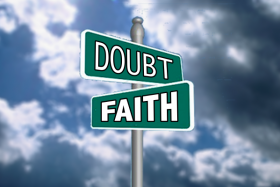From the Letter of James:
If any of you is lacking in wisdom, ask God, who gives to all generously and ungrudgingly, and it will be given you. But ask in faith, never doubting, for the one who doubts is like a wave of the sea, driven and tossed by the wind; for the doubter, being double-minded and unstable in every way, must not expect to receive anything from the Lord.
(From the Daily Office Lectionary – James 1:5-8 – November 15, 2012)
 I suppose I take issue with Scripture more often than I should, but this is one of those bits that I just can’t agree with. I vehemently disagree with James’s equation of “doubt” with what he calls “double-mindedness”. The Greek word translated “double-minded” is dipsuchos , from dis , meaning “twice,” and psuche , meaning “mind.” James use of it to describe someone who has doubts suggests that such a person is divided in his or her interests or loyalties, wavering, two-faced, and half-hearted.
I suppose I take issue with Scripture more often than I should, but this is one of those bits that I just can’t agree with. I vehemently disagree with James’s equation of “doubt” with what he calls “double-mindedness”. The Greek word translated “double-minded” is dipsuchos , from dis , meaning “twice,” and psuche , meaning “mind.” James use of it to describe someone who has doubts suggests that such a person is divided in his or her interests or loyalties, wavering, two-faced, and half-hearted.
When I think of those “qualities”, I think of hypocrisy, not doubt. That’s another Greek word. In the Greek theater, actors would speak (krinomai) from behind a mask (hypo). Together the Greek words for speak and mask form hupokrisis; from that we get our word “hypocrisy”. The dictionary defines “hypocrisy” thusly: “a pretense of having a virtuous character, moral or religious beliefs or principles, etc., that one does not really possess.” The thesaurus lists these synonyms: “affectation, bad faith, bigotry, cant, casuistry, deceit, deception, dishonesty, display, dissembling, dissimulation, double-dealing, duplicity, false profession, falsity, fraud, glibness, imposture, insincerity, irreverence, lie, lip service, mockery, pharisaicalness, pharisaism, phoniness, pietism, quackery, sanctimoniousness, sanctimony, speciousness, unctuousness.” This is all very different from doubt.
To doubt, says the dictionary, is “to be uncertain about; consider questionable or unlikely; hesitate to believe.” Doubt is an honest state of uncertainty, not the dishonest state of double-minded divided loyalties, not the hypocritical state of two-facedness. Unfortunately, James equation of doubt with “double-mindedness” and his contrast of doubt with faith (like the post-Resurrection story of “doubting Thomas”) unnecessarily villifies those who have legitimate questions, those who hestitate to believe because of genuine uncertainty.
But faith and doubt are not opposites! The current Pope once wrote a book entitled Introduction to Christianity in which, using a stageplay about a shipwrecked priest as a metaphor, he took up the question of belief, faith, and doubt. He wrote:
Just as the believer does not live immune to doubt but is always threatened by the plunge into the void, so now we can discern the entangled nature of human destinies and say that the nonbeliever does not lead a sealed-off, self-sufficient life either . . . Just as the believer is choked by the salt water of doubt constantly washed into his mouth by the ocean of uncertainty, so the nonbeliever is troubled by doubts about his unbelief, about the real totality of the world he has made up his mind to explain as a self-contained whole.
Faith is the decision to believe in the face of doubt. The atheist would say that religious faith is the choice to believe something for which there is no evidence; the believer would say that refusal to believe in God is itself a faith based on ignoring evidence. Both must admit that their belief or unbelief is subject to uncertainty. This is not double-mindedness. It is intellectual and spiritual honesty.
Faith and doubt are not opposites; they go hand in hand with one another. The very nature of faith requires that we acknowledge doubt, that we acknowledge that we believe with less than 100 percent certainty. We all wrestle with the challenges, questions, and blessings of life; faith in the midst of doubt and doubt examining faith are simply part of that struggle.
====================
A request to my readers: I’m trying to build the readership of this blog and I’d very much appreciate your help in doing so. If you find something here that is of value, please share it with others. If you are on Facebook, “like” the posts on your page so others can see them. If you are following me on Twitter, please “retweet” the notices of these meditations. If you have a blog of your own, please include mine in your links (a favor I will gladly reciprocate). Many thanks!
====================
Father Funston is the rector of St. Paul’s Episcopal Church, Medina, Ohio.



Leave a Reply